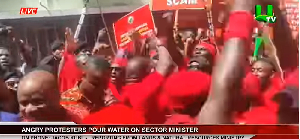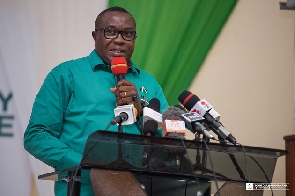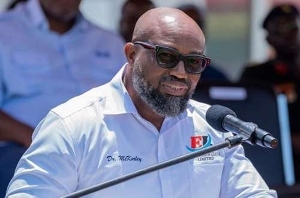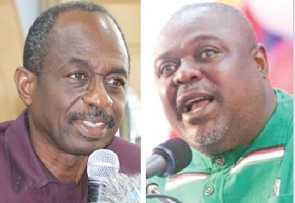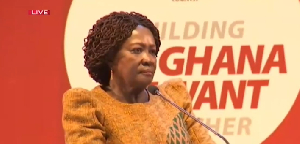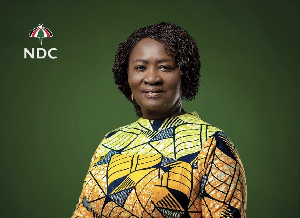It no longer has to do with a choice of a preferred candidate, either by family traits or what one stands to gain but on the genuine and pure love that one has for the gigantic creature with precious ivory. How can one effectively put the numbers together and strike across the matrix to make the best decision to save the “kukrudu” from a long temporary extinction and a possible comeback. Ghana needs a strong opposition capable of winning elections to send the right signals of an effective democracy to attract effective donor support in our quest to reach middle income status.
In the upcoming elections, I wish delegates will answer some hidden questions which though may sound irrelevant or unimportant presently, but is capable of making or breaking the near future fortunes of the party before they vote. “How easy or difficult is it for the NDC to loose power in 2012?” “How easy or difficult will it be for the NDC to loose power in 2016, if they win 2012? What happens if the NPP looses the 2012 elections? (I think I heard someone say “God forbid”) “What is the NPP doing to have an edge over the NDC in 2016?”“ Genuine and objective answers to these questions, devoid of sentiments and wishful thinking will save the party.
In 2000, President Mills was more popular than Kuffour but lost to Kuffour. Kuffour won primarily because the NDC fielded a new candidate in Mills while Kuffour had already run before against Rawlings and lost. In 2004, Kuffour further stretched his numbers and won again by about 673,706 votes. Since the first round of voting is the real observation of support for a candidate, one will not be wrong to say Kuffour increased his votes from 48.4% to 54.45% in the 2000 and 2004 elections respectively. . This happened when cost of living had increased and the standard of living was plummeting and NPP’s promises of reduction in the prices of goods and services were striking the rocks.
By 2008, Nana Akufo-Addo had become so popular with his name gallivanting on nike sneakers all over the place but lost to Mills. Mills primarily won because the NPP fielded a new candidate in Nana Akufo-Addo whilst Mills had already run against Kuffour twice and had lost. These events leave a lot to consider. Popularity matters but must be considered advisedly taking into account factors like timing and the kind of opponents to contest.
In 2012, all things being equal, the President of the day will be running against an opposition candidate as opposed to a new candidate from the ruling party contesting against the opposition candidate. Majority of those who support Nana are doing so because they think Nana has popularity, been marketed already and lost by just 40,000 votes in 2008, aiming to suggest that it will be easier for Nana to win in 2012. This assumption by anyone is a complete fallacy. The fact that you lost elections with a small margin does not guarantee that with a little more hard work, you can win in the next one by taking back the few votes that made you loose in the previous. This is not primary school elections.
As a matter of fact, if Nana was marketed this effectively in just months, why can’t a new candidate be marketed effectively with even less resources within the two years that the NPP has before the 2012 elections? If in case another candidate is better than Nana and can win Ghanaian votes but is not as popular as Nana, do the advantages of Nana’s popularity outweigh the effectiveness of the new candidate in grabbing the votes of Ghanaians if given the chance? If another candidate, with Nana’s popularity can perform better than Nana, it just makes sense that he should be given the opportunity. Aside that, the other contestants for the flagbearership slot also have some popularity. It won’t be erroneous to say that almost every home that knows the face of Nana surely knows that of Alan Kyeremanteng.
Popularity is good but should be based on positives. Of course Atta Ayee, is more popular than most of the contestants. Nana is surely a good candidate but has issues that need to be addressed. First is the issue of perceptions that he is a drug addict. NPP runs away from this issue at their peril. It is out there and needs to be tackled. Other candidates in our history have had similar issues but boldly dealt with them. Example, Rawlings has on numerous occasions spoken about the perception of his link to the murder of the judges and has denied it publicly. He has publicly apologized for the excesses and has never denied there were excesses during his time as Head of State. It wouldn’t have done him any good if he had just ignored them. Prof Mills in 2008 spoke openly about perceptions and reports that he was very ill and too weak to become President. Ghanaians are yet to hear Nana talk about the perception that he is a drug addict and arrogant. He may decide to ignore it like he did in the past but it doesn’t work. Silence means concern to most of us Ghanaians.
In analyzing the situation that the NPPP finds itself in, it will serve the party a lot of good if it looks beyond 2012 in selecting a flag bearer. A flag bearer who is capable of contesting again in 2016 will be the best bet for the survival of the elephant, without which the elephant may most probably become extinct for another 16 years. A candidate who, even if he looses in 2012 will be able to contest against a new NDC face in 2016 should be given the best consideration. In that case, the candidate will enjoy sympathy votes, popularity and goodwill over the new candidate of the NDC. If the NPP fields someone who cannot contest in 2016 and looses in 2012, it may spark disaster for the party. The party will now have to elect a new face against another new face of an incumbent party with all the ammunitions to do damage. What if the new face of the NDC in 2016 is the current Vice President who already has some popularity? Your prediction is as good as mine.
Truth hurts but it liberates. In all fairness, 2012 will be quite difficult for the NPP. They can choose to admit it or deny it. Contrary to the political talk, the NDC is fulfilling its promises bit by bit - School children are being given uniforms, exercise books and text books, Single Spine Salary Structure is being implemented, Yaa Naa’s trial is on course, Inflation is down, Shift system is being abolished with the building of many school structures, SHS has been reverted to 3 years, Southern Accelerated Development Act is in the offing. Though these achievements fail to make living conditions better for Ghanaians, they are still fulfilled promises which the NDC will tout in 2012.
Prof Frimpong Boateng is said to have made a comment that a party can only win elections in Ghana with the help of minority parties and floating voters. Floating voters tend to be very patriotic, morally sound and intelligent. These are hard brains who vote based on conscience and what they perceive to be right, as opposed to the hard line party sympathizers who just vote for their own personal selfish benefits or the fulfillment of some tribal or traditional undertaking. How easy is it for this crop of hard brains called “floating voters” to kick out the NDC in 2012. Feelings, wishes and believes don’t work here anymore.
The NPP needs to seriously consider the future of the party than fulfilling the individual interests of spoke party aspirants. In case they fail to win in 2012, do they have a plan that will give them an edge over the NDC in 2016? A mistake in 2012 can mar the fortunes of 2016 and send the elephant too deep into the bush. I hope the NPP will listen this time because I may as well be a Larry Gibson offering free services this time around.
Andre Horgle horgleandre@yahoo.com

